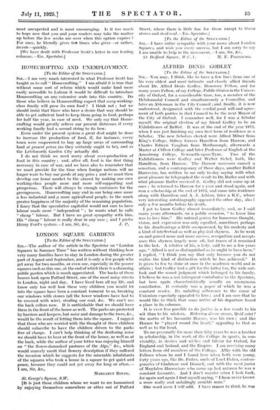LONDON SQUARE GARDENS
[To the Editor of the SPECTATOR.] Sin,—The author of the article in the Spectator on " London Squares in Summer Time" has written without thinking how very many families have to stay in London during the greater part of August and September, and it is only a few people who get away for two months, or even one, especially in the poorer squares such as this one, at the end of which there is a charming public garden which is much appreciated. The backs of these houses look upon Pulford Street, one of the most noisy streets in London, night and day. I have lived here all my life, and know only too well how these very children you would let into the square have been a constant torment to us, breaking our windows with stones (all the lower windows have had to be covered with wire), stealing our coal, &c. We can't use the back cellars now. It is unthinkable that we should have them in the front of the house as well. The parks are protected by barriers and keepers, but noise and damage to the trees, &c., would be the result of letting them into the square. I suggest that those who are worried with the thought of these children should subscribe to have the children driven to the parks free of charge. I can't help thinking of the deafening noise we should have to bear at the front of the house, as well as at the back, while the author of your letter was enjoying himself on " the flower-damasked pastures of the Alps," &c., which would scarcely merit that flowery description if they suffered the invasion which he suggests for the miserable inhabitants of the squares who took a house in a square to get quiet and peace, because they could not get away for long or often.— I am, Sir, &c., St. George's Square, S.W.
MARGARET ROLFE.
[It is just these children whom we want to see humanized by enjoying themselves somewhere or other out of Pulford Street, where there is little fun for them except to throw stones and steal coal.—En. Spectator.] [To the Editor of the SPECTATOR.] SIR,—I have entire sympathy with your move about London Squares, and wish you every success, but I am sorry to say I am unable to help in the movement.—I am, Sir, &c.,


























































 Previous page
Previous page